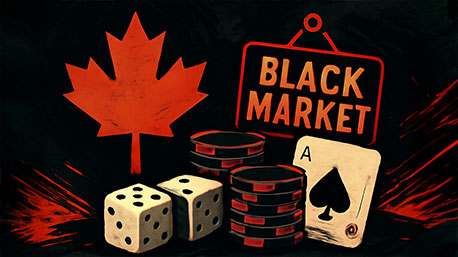Canadian Gaming Association: Black Market Ends Gambling Monopolies

The rise of the black market has fundamentally altered Canada’s gambling industry. Paul Burns, president and CEO of the Canadian Gaming Association (CGA), believes the increasing presence of unregulated iGaming has rendered the old monopoly system obsolete.
CGA: The Black Market’s Impact on Gambling Monopolies
During an interview with GGB magazine, Burns pointed out that for over 25 years, the monopoly model has been irrelevant due to the widespread operation of grey market gambling in Canada. “Because of the large unregulated iGaming market presence in Canada, no one’s had a monopoly for 25 years and that’s the reality,” he explained.
Alberta has taken significant steps to move away from this outdated system by passing the iGaming Act, which paves the way for the province to introduce a regulated online gambling market by 2026. Ontario has already set the precedent, having launched its own regulated market in 2022, but other provinces remain resistant to adopting similar reforms.
Burns is urging the remaining provinces to follow in Alberta’s and Ontario’s footsteps, warning that “there’s no time to pause anymore” as new challenges emerge for regulators. Despite the slow pace of change, provinces like British Columbia and Québec continue to operate under monopoly frameworks.
Ontario’s Model: A Success for Regulated Markets
Ontario is often seen as a success story in market liberalisation. The Alcohol and Gaming Commission of Ontario recently reported that the province’s regulated market has achieved an 84% channelisation rate. H2 Gambling Capital’s estimates show this figure could be closer to 93%, a substantial improvement from 83% in 2023.
However, there’s still a lingering issue: approximately 20.2% of players on regulated platforms are also engaging with unregulated sites. Burns praised Ontario’s strategy for integrating grey market operators and creating incentives for them to join the regulated market. “Ontario built a market that invited grey market operators and made it advantageous for them to join,” Burns said.
He is hopeful Alberta will replicate this approach. “Alberta is clearly leading with strong measures of consumer protection,” Burns noted, adding that Alberta’s regulatory model aims to balance consumer protection with incentives for private operators to join the regulated system.
At present, PlayAlberta, the only regulated gambling platform in Alberta, captures only around 20% of the market, leaving the majority of iGaming activity in the hands of unregulated operators. This is expected to change once the province’s new framework is implemented.
Alberta’s iGaming Bill Faces Setback in Responsible Gambling Measures
Despite progress in Alberta’s move to regulate online gambling, the province recently experienced a setback in its efforts to strengthen responsible gambling provisions. On April 30, 2025, proposed amendments by the NDP to include more robust responsible gambling safeguards in the iGaming Alberta Act were defeated during a vote in the Committee of the Whole. The NDP’s proposal called for the creation of a harm-reduction program and independent evaluations of the effectiveness of responsible gambling measures, but the amendments failed to pass by a margin of 38 nays to 16 yays.
In response, Service Alberta Minister Dale Nally argued that responsible gambling measures should be handled by regulatory bodies, not written into law. This flexibility, he said, would allow for quicker adjustments if needed. While the NDP voiced concerns about the bill’s insufficient focus on responsible gambling, the bill itself continues to move forward, with a focus on creating a regulated market for online gambling.
The iGaming Alberta Act proposes the establishment of a new Alberta iGaming Corporation to oversee online gambling, with Alberta Gaming, Liquor and Cannabis (AGLC) maintaining regulatory oversight. The bill aims to capture the significant revenue currently flowing to unregulated offshore platforms, with PlayAlberta poised to compete more effectively against private operators once the new system is in place.
Though the defeat of the amendments represents a loss for some stakeholders, the overall trajectory toward regulation remains intact. The bill’s supporters argue that Alberta’s approach will help bring more of the market under local control, ensuring better protection for consumers.
Source:
“Canadian Gaming Association: Black Market Has Ended Monopolies”, casinoreports.ca, May 14, 2025.







